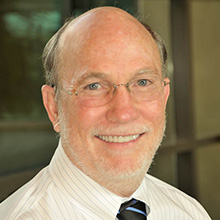Texas Biomed congratulates scientists on Nobel Prize
San Antonio, Texas (Oct. 8, 2020) – Texas Biomedical Research Institute (Texas Biomed) congratulates scientists Harvey J. Alter, National Institutes of Health in Bethesda, Md., Michael Houghton, University of Alberta, Edmonton, Canada and Charles Rice, Rockefeller University, New York, NY., on their 2020 Nobel Prize in medicine or physiology for discovering the hepatitis C (HCV) virus, which Texas Biomed played a critical role in curing. The Nobel Laureates worked with several Texas Biomed scientists on animal studies, publishing numerous papers together over the years. From discovery to cure, the hepatitis C virus is a decades-long success story towards a cure.

“Dr. Alter conducted numerous chimpanzee studies at Texas Biomed. Some of those studies outlined the process to inactivate Non-Hepatitis A and Non-Hepatitis B (NANB) in the blood and make blood products safe from transmitting NANB,” Dr. Lanford explained. “He [Dr. Alter] made the panel of documented samples that was needed to authenticate any assays or clones of the virus.”
HCV is a blood-transmitted virus and is a major cause of liver cancer. More than 71 million people globally are chronically affected with HCV. In the United States, HCV is the most common chronic viral infection found and spread through blood. Many people are unaware that they’re infected, according to the National Institute of Diabetes and Digestive and Kidney Diseases.
“Dr. Houghton was the first to clone a fragment of the genome of the virus leading to the assay that detected HCV antibodies in blood. This finding led to an end of an era in which this virus caused hepatitis through blood transfusions. For many years, Dr. Houghton had a large HCV vaccine program at SNPRC with some very promising candidates, but today we still do not have a licensed vaccine, ” Dr. Lanford emphasized.
The trio relied heavily on chimpanzee studies, which the SNPRC at Texas Biomed provided and monitored. These non-human primates were the only animal models susceptible to the disease outside of humans and assisted in the development of many biomedical discoveries. In 2015, three years after the testing of a monoclonal antibody to prevent HCV infection was conducted at Texas Biomed, chimps were retired from biomedical research.
“Dr. Rice provided the missing piece of the puzzle for scientists around the globe to advance their HCV research by completing the last part of the HCV genome (the elusive 3’ end) and demonstrating that his clone was infectious in chimpanzees,” Dr. Lanford said. “Dr. Rice also discovered two of the receptors used by the virus to enter and infect cells, and developed transgenic mice with human receptors that could be directly infected with HCV. He also developed a strain of the virus that could replicate in culture and was still infectious in chimpanzees.”
Dr. Lanford collaborated with Dr. Rice in the chimpanzee studies and said that this strain was critical for future research, as most cell-culture adapted virus had mutated.
As noted in a recent post by the Foundation for Biomedical Research, “Nobel-winning animal research happens practically every year. In fact, of the 222 award recipients in the Physiology or Medicine category, 186 used animal models in their research.”
Today, antiviral medications are used to cure HCV infection, in most cases. Between 1999 and 2013, Texas Biomed and SNPRC partnered with more than 20 companies and scientific partners to examine the safety and efficacy of HCV antivirals in nonhuman primates, which is the last step to human clinical trial.
“Texas Biomed is proud of the work Dr. Lanford, his lab and the team at SNPRC did in not only furthering critical basic discoveries, but also their work in proving the safety and efficacy of some of the first medications that could cure HCV and were brought to market,” said Texas Biomed President and CEO Dr. Larry Schlesinger. “HCV is an excellent example of what can happen when the world combined the best scientific minds with animal science and technological advancements and teamwork. Within a lifetime, the world went from discovery of a novel virus to cure.”
###
Texas Biomed is one of the world’s leading independent biomedical research institutions dedicated to eradicating infection and advancing health worldwide through innovative biomedical research. Texas Biomed partners with researchers and institutions around the world to develop vaccines and therapeutics against viral pathogens causing AIDS, hepatitis, hemorrhagic fever, tuberculosis and parasitic diseases responsible for malaria and schistosomiasis disease. The Institute has programs in host-pathogen interactions, disease intervention and prevention and population health to understand the links between infectious diseases and other diseases such as aging, cardiovascular disease, diabetes and obesity. For more information on Texas Biomed, go to www.TxBiomed.org.